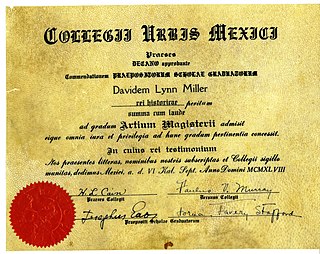This article needs additional citations for verification .(November 2024) |
The Bachelor of Applied Arts and Sciences, often abbreviated as BAAS or BAASc, is an undergraduate degree. [1]
This article needs additional citations for verification .(November 2024) |
The Bachelor of Applied Arts and Sciences, often abbreviated as BAAS or BAASc, is an undergraduate degree. [1]
In the United States, the Bachelor of Applied Arts and Sciences (B.A.A.S.) degree is considered a completion degree. The degree can be awarded to students who have both technical education and traditional college/university education. Some universities also give credit for work-related training and certification completed by the student. Applied Arts and Sciences degree programs typically require a student to complete an academic core program consisting of English, History, Political Science, Philosophy and Sociology and the Sciences like Mathematics, Biology, Chemistry and Physics consisting of 40-60 semester credit hours. Technical coursework can count 30-60 credit hours, and in some cases, work experience and certifications are evaluated and up to 30 credit hours may be awarded towards a degree. Upper level academic credit hours make up 30-45 hours of coursework, depending on the program. Some programs include the declaration of a particular major or specialization. Others include several concentrations. A total of 120 semester hours is the typical total credit requirement for most Bachelor's degree programs in the United States.
BAAS degrees are fully accredited degrees when offered by accredited educational institutions and meet the same qualifications as more traditional Bachelor's degrees, allowing admission into graduate schools and law schools for further study in pursuit of Master's degrees or Doctoral degrees.

Postgraduate education, graduate education, or graduate school consists of academic or professional degrees, certificates, diplomas, or other qualifications usually pursued by post-secondary students who have earned an undergraduate (bachelor's) degree.
An academic degree is a qualification awarded to a student upon successful completion of a course of study in higher education, usually at a college or university. These institutions often offer degrees at various levels, usually divided into undergraduate and postgraduate degrees. The most common undergraduate degree is the bachelor's degree, although some educational systems offer lower-level undergraduate degrees such as associate and foundation degrees. Common postgraduate degrees include engineer's degrees, master's degrees and doctorates.
A bachelor's degree or baccalaureate is an undergraduate degree awarded by colleges and universities upon completion of a course of study lasting three to six years. The two most common bachelor's degrees are the Bachelor of Arts (BA) and the Bachelor of Science. In some institutions and educational systems, certain bachelor's degrees can only be taken as graduate or postgraduate educations after a first degree has been completed, although more commonly the successful completion of a bachelor's degree is a prerequisite for further courses such as a master's or a doctorate.
An associate degree or associate's degree is an undergraduate degree awarded after a course of post-secondary study lasting two to three years. It is a level of academic qualification above a high school diploma and below a bachelor's degree.

A diploma is a document awarded by an educational institution testifying the recipient has graduated by successfully completing their courses of studies. Historically, it has also referred to a charter or official document of diplomacy.

A Fachhochschule, abbreviated FH, is a university of applied sciences (UAS), in other words a German tertiary education institution that provides professional education in many applied sciences and applied arts, such as engineering, technology, business, architecture, design, and industrial design.

Bright Futures is a scholarship program in the state of Florida. It is funded by the Florida Lottery and was first started in 1997.
A Master of Engineering is a professional master's degree in the field of engineering.
A degree completion program is an undergraduate academic program, most frequently found in the United States and Canada, that is offered within an established university but designed for non-traditional students. Degree completion programs are typically structured to allow persons who previously completed a substantial portion of the requirements for an undergraduate degree, but who have been separated from the university setting for a period of time, to complete the credit requirements needed to earn a bachelor's degree (B.A.), either at an accelerated pace, or a flexible schedule. The difference between credits previously earned, and those required for the award of a B.A., are made-up through a variety of methods depending on the sponsoring institution, but typically include a combination of traditional university courses and CLEP examinations.
Columbia State Community College is a public community college in Columbia, Tennessee. Founded in 1966, it serves nine counties in southern Middle Tennessee through five campuses. It is accredited by the Southern Association of Colleges and Schools Commission on Colleges to award Associate of Arts, Associate of Science, Associate of Science in Teaching, Associate of Fine Arts, and Associate of Applied Science degrees, and technical certificates.
An engineer's degree is an advanced academic degree in engineering which is conferred in Europe, some countries of Latin America, North Africa and a few institutions in the United States. The degree may require a thesis but always requires a non-abstract project. To obtain an Engineer's degree in Asia, the duration of study typically ranges from 4 to 5 years, depending on the country and university. Additionally, there may be further requirements for certifications or licenses to practice engineering after graduation.
The specialist degree is an academic degree conferred by a college or university. The degree is formatted differently worldwide and may be either a five-year program or a doctoral level graduate program that occurs after a master's degree but before a doctoral degree. In the post-Soviet system, the degree is between a bachelor's and a master's degree.
A Diplom is an academic degree in the German-speaking countries Germany, Austria, and Switzerland and a similarly named degree in some other European countries including Albania, Bulgaria, Belarus, Bosnia and Herzegovina, Croatia, Estonia, Finland, Poland, Russia, and Ukraine and only for engineers in France, Greece, Hungary, North Macedonia, Romania, Serbia, Slovenia, and Brazil.
The Master of Education is a master's degree awarded by universities in many countries. This degree in education often includes the following majors: curriculum and instruction, counseling, school psychology, and administration. It is often conferred for educators advancing in their field. Similar degrees include the Master of Arts in Education and the Master of Science in Education.
The Master of Accountancy, alternatively Master of Science in Accounting or Master of Professional Accountancy, is a graduate professional degree designed to prepare students for public accounting; academic-focused variants are also offered.
Master's degrees in Europe are the second cycle of the Bologna process, following on from undergraduate bachelor's degrees and preceding third cycle doctorates. Master's degrees typically take two years to complete, although the number of years varies between countries, and correspond to 60 – 120 ECTS credits. Within the European Higher Education Area, representing almost all countries in Europe, master's degrees are referenced to the Framework of Qualifications for the European Higher Education Area and national qualifications frameworks.

Higher education in Norway is offered by a range of ten universities, nine specialised universities, 24 university colleges as well as a range of private university colleges. The national higher education system is in accordance with the Bologna process, with bachelor's degrees, master's degrees and doctoral degrees. Acceptance is offered after finishing upper secondary school and meeting general university admissions certification.
The basic requirement for pharmacists to be considered for registration is often an undergraduate or postgraduate pharmacy degree from a recognized university. In many countries, this involves a four- or five-year course to attain a bachelor of pharmacy or master of pharmacy degree.
Southeastern Institute of Technology (SIT), Huntsville, Alabama, was a professional school from 1976 to 2004 providing continuing education and granting professional degrees focusing on application.
A high school diploma or high school degree is a diploma awarded upon graduation of high school. A high school diploma is awarded after completion of courses of studies lasting four years, typically from grade 9 to grade 12. It is the school leaving qualification in the United States and Canada.